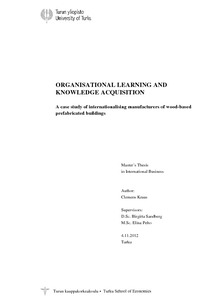Organisational learning and knowledge acquisition. A case study of internationalising manufacturers of wood-based prefabricated buildings
Kraus, Clemens (2012-11-04)
Organisational learning and knowledge acquisition. A case study of internationalising manufacturers of wood-based prefabricated buildings
Kraus, Clemens
(04.11.2012)
Julkaisun pysyvä osoite on:
https://urn.fi/URN:NBN:fi-fe201304032686
https://urn.fi/URN:NBN:fi-fe201304032686
Kuvaus
siirretty Doriasta
Tiivistelmä
The study investigates organisational learning and knowledge acquisition of wood-based prefabricated building manufacturers. This certain group of case companies was chosen, because their management and their employees generally have a strong manufacturing and engineering background, while the housing sector is characterised by national norms, regulations, as well as local building styles. Considering this setting, it was investigated, how the case companies develop organisational learning capabilities, acquire and transfer knowledge for their internationalisation. The theoretical framework of this study constitutes the knowledge-based conceptualisation of internationalisation, which combines the traditional internationalisation process, as well as the international new venture perspective based on their commonalities in the knowledge-based view of the firm. Different theories of internationalisation, including the network-perspective, were outlined and a framework on organisational learning and knowledge acquisition was established. The empirical research followed a qualitative approach, deploying a multiple-case study with five case companies from Austria, Finland and Germany. In the study, the development of the wood-based prefabricated building industry and of the case companies are described, and the motives, facilitators and challenges for foreign expansion, as well as the companies’ internationalisation approaches are compared. Different methods of how companies facilitate the knowledge-exchange or learn about new markets are also outlined.
Experience, market knowledge and personal contacts are considered essential for the internationalisation process. The major finding of the study is that it is not necessary to acquire the market knowledge internally in a slow process as proposed by the Uppsala model. In four cases companies engaged knowledge in symbiotic relations with local business partners. Thereby, the building manufacturers contribute their design and production capabilities, and in return, their local partners provide them with knowledge about the market and local regulations; while they manage the sales and construction operations. Thus, the study provides strong evidence for the propositions of network perspective. One case company developed the knowledge internally in a gradual process: it entered the market sequentially with several business lines, showing an increasing level of complexity. In both of the observed strategies, single-loop and double-loop learning processes occurred.
Experience, market knowledge and personal contacts are considered essential for the internationalisation process. The major finding of the study is that it is not necessary to acquire the market knowledge internally in a slow process as proposed by the Uppsala model. In four cases companies engaged knowledge in symbiotic relations with local business partners. Thereby, the building manufacturers contribute their design and production capabilities, and in return, their local partners provide them with knowledge about the market and local regulations; while they manage the sales and construction operations. Thus, the study provides strong evidence for the propositions of network perspective. One case company developed the knowledge internally in a gradual process: it entered the market sequentially with several business lines, showing an increasing level of complexity. In both of the observed strategies, single-loop and double-loop learning processes occurred.
